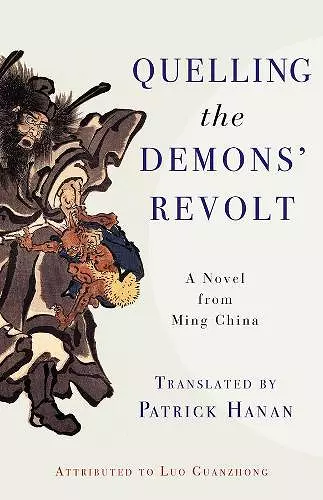Quelling the Demons' Revolt
A Novel from Ming China
Guanzhong Luo author Patrick Hanan translator David Der-wei Wang editor Ellen B Widmer editor
Format:Paperback
Publisher:Columbia University Press
Published:26th Sep '17
Currently unavailable, and unfortunately no date known when it will be back

In this Ming-era novel, historical narrative, raucous humor, and the supernatural are interwoven to tell the tale of an unsuccessful attempt to overthrow the Song dynasty. Though Quelling the Demons' Revolt centers on the events of the rebellion led by Wang Ze in 1047-48, facts are distorted and intermingled with slapstick humor and wild fictions. The author points to human vanities and fixations as well as social injustice, warning of the vulnerability of any pursuit of order in a world plagued by demonic forces as well as mundane corruption. This translation offers English-speaking readers a spirited example of social critique and caustic humor.
In this Ming-era novel, historical narrative, raucous humor, and the supernatural are interwoven to tell the tale of an attempt to overthrow the Song dynasty. Quelling the Demons’ Revolt is centered on the rebellion led by Wang Ze in 1047–48, warning of the vulnerability of a world plagued by demonic forces as well as mundane corruption.In this Ming-era novel, historical narrative, raucous humor, and the supernatural are interwoven to tell the tale of an unsuccessful attempt to overthrow the Song dynasty. A poor young girl meets an old woman who gives her a magic book that allows her to create rice and money. Her father, terrified that his daughter's demonic nature might be discovered, marries her off. Forced to flee, she and others with supernatural abilities find themselves in the midst of a grotesque version of a historical uprising, in which facts are intermingled with slapstick humor and wild fictions. Attributed to the writer Luo Guanzhong, Quelling the Demons' Revolt is centered on the events of the rebellion led by Wang Ze in 1047-48. But it is a distorted, humorous version, in which Wang Ze's lieutenants show up as a comical peddler and a mysterious Daoist priest and a celebrated warrior appears despite having died many years earlier. Rather than fantastic adventures and supernatural marvels, the author points to human vanities and fixations as well as social injustice, warning of the vulnerability of any pursuit of order in a world plagued by demonic forces as well as mundane corruption. Although the story takes place long before the era in which it was written, ultimately Quelling the Demons' Revolt is the story of the Ming dynasty in Song masquerade, presciently warning of the dynasty's downfall. The novel is divided into chapters, but in many ways it is an arrangement of self-contained stories that draw on vernacular storytelling. This translation offers English-speaking readers a spirited example of social critique combined with caustic humor from the era of Luo Guanzhong.
Quelling the Demons' Revolt is a marvelous late Ming novel, here beautifully translated by Patrick Hanan. It features a strong heroine, Eterna Hu (or is she a villain?). The demonic exists just under the surface of everyday life, and when it erupts into full revolt, supernatural powers are called upon to restore order. Martial ardor, political authority, and magic propel the plot of the novel. Although I do not want to diminish the ways in which it would be useful in classrooms in a variety of disciplines (literature, religion, gender studies), its utility should not obscure the fact that it is a rollicking good read. -- Ann Waltner, University of Minnesota Quelling the Demon's Revolt by Patrick Hanan is a spirited translation. Beginning with a revolt led by a messianic Buddhist movement, the novel moves from historical events of the eleventh century to stories of folly and venality that resonate with audiences of any era. This comic novel is a cornucopia of tales about trickery, seduction, demonology and the supernatural, played out by pawnbrokers, seducers, rebels, dim-witted magistrates and strong-minded women. Hanan's translation deftly captures the wit and vitality of the original work. -- Anne McLaren, The University of Melbourne Good tidings! In this new, posthumous translation of one of the most delightful and neglected examples of the early modern Chinese novel, Patrick Hanan's stylish brush lives again. There is near perfect fusion between the magic feats depicted in this riotous novel of unruly demons run amok in the everyday world and the magic of the translator's voice to conjure them up for us. The perfect length and subject matter for classroom teaching. -- Judith Zeitlin, University of Chicago
ISBN: 9780231183079
Dimensions: unknown
Weight: unknown
240 pages